译林版(2020) 选择性必修第一册 Unit 4 Exploring Poetry Welcome to the unit & Reading 课件(35张PPT)
文档属性
| 名称 | 译林版(2020) 选择性必修第一册 Unit 4 Exploring Poetry Welcome to the unit & Reading 课件(35张PPT) |
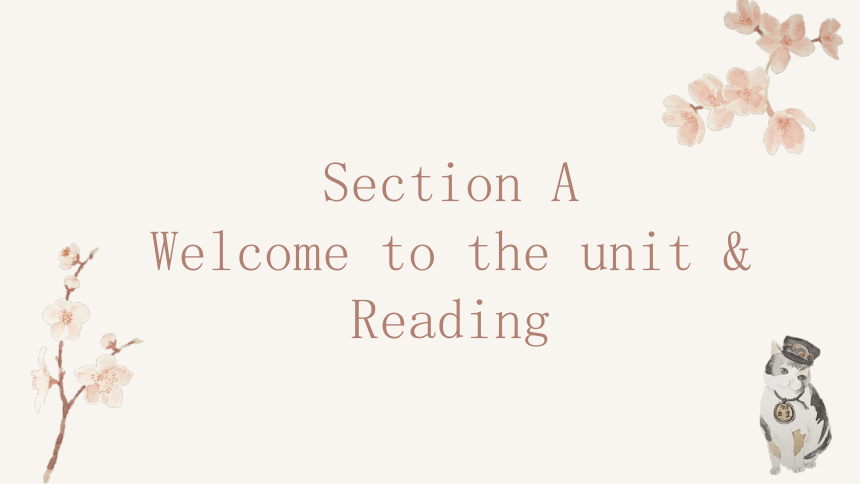
|
|
| 格式 | pptx | ||
| 文件大小 | 4.1MB | ||
| 资源类型 | 教案 | ||
| 版本资源 | 牛津译林版(2019) | ||
| 科目 | 英语 | ||
| 更新时间 | 2022-10-20 00:00:00 | ||
图片预览

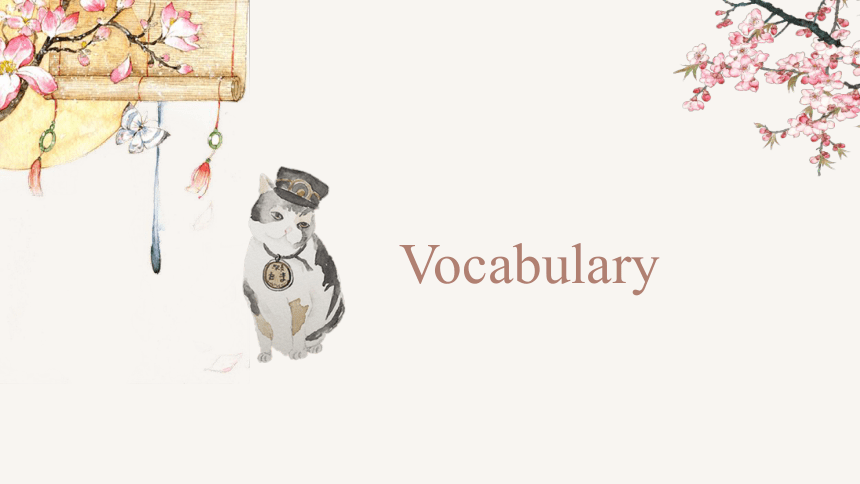
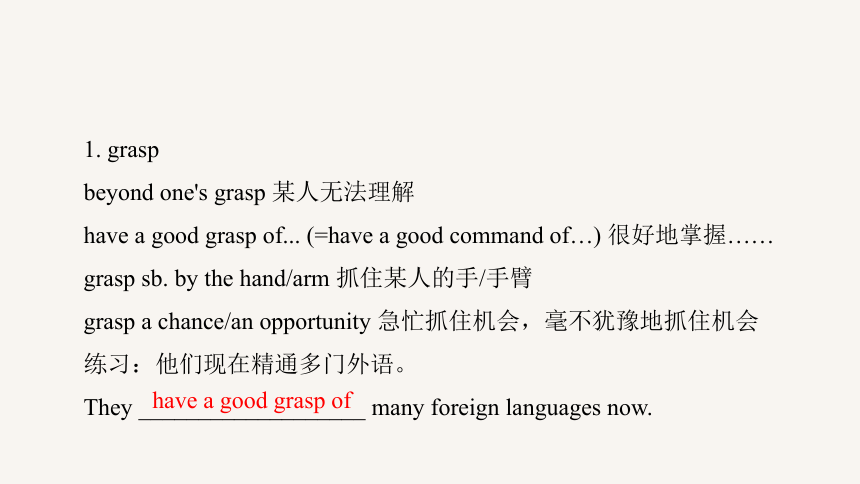
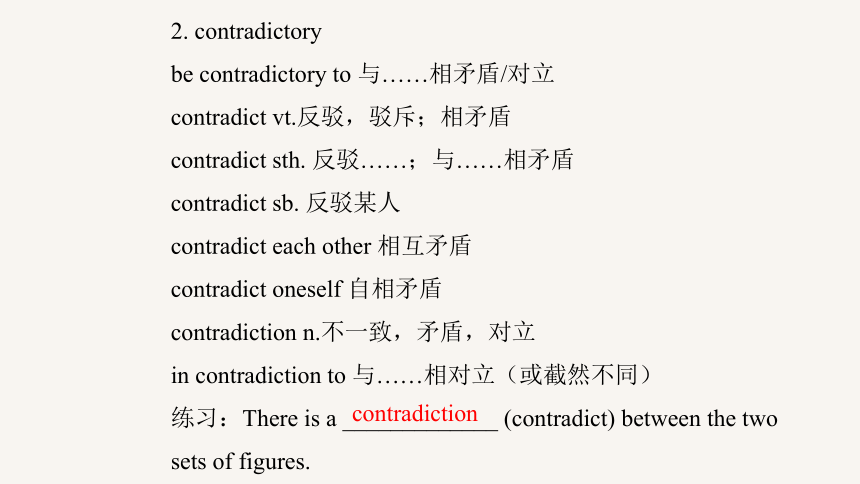
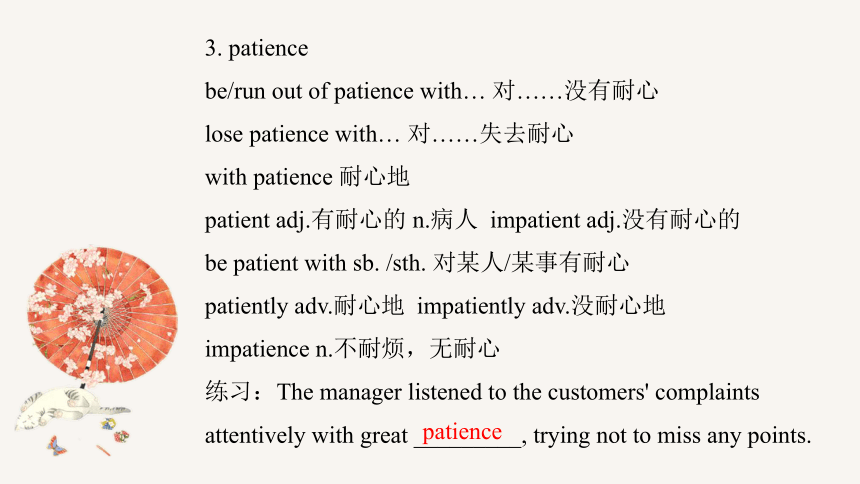
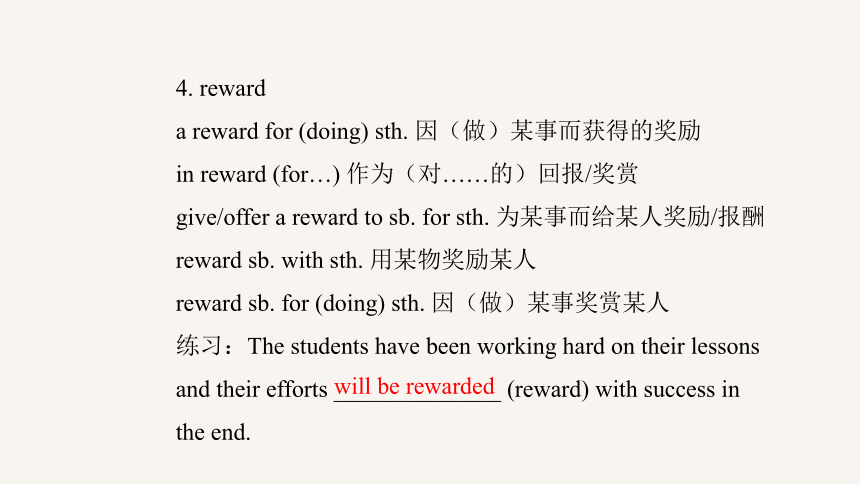
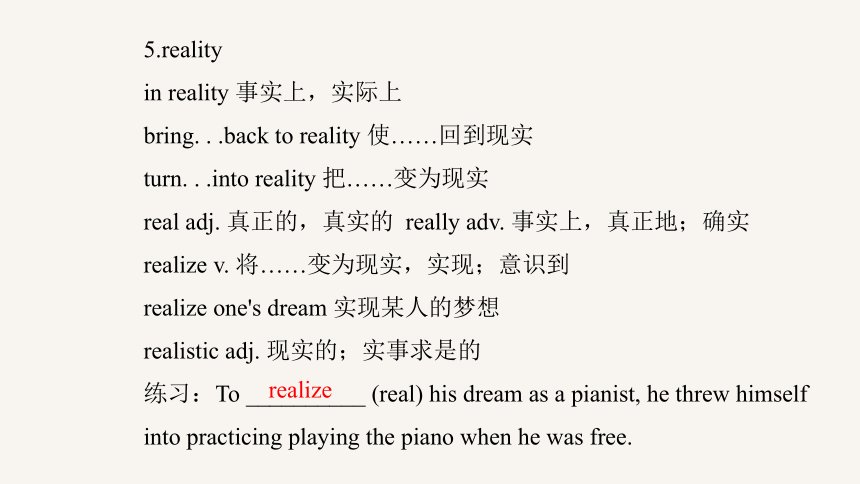
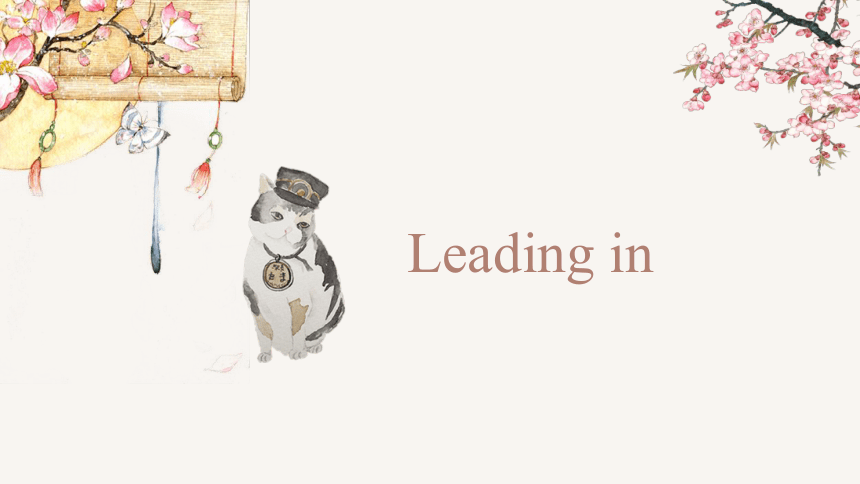
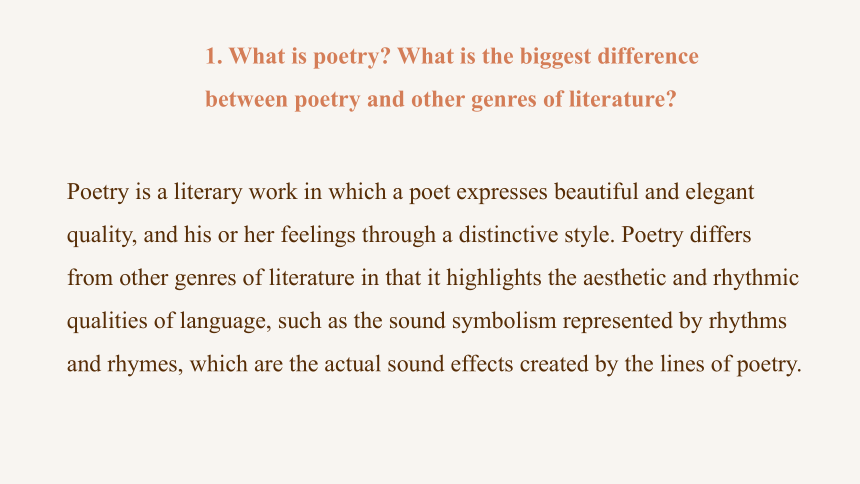
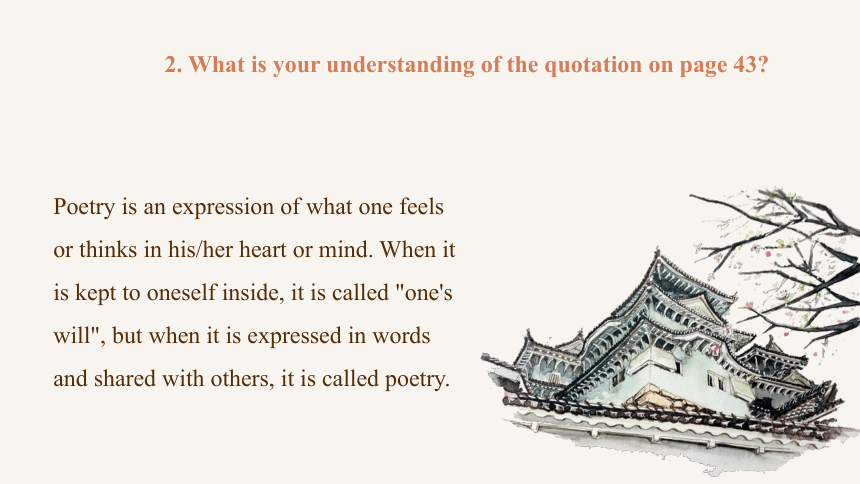
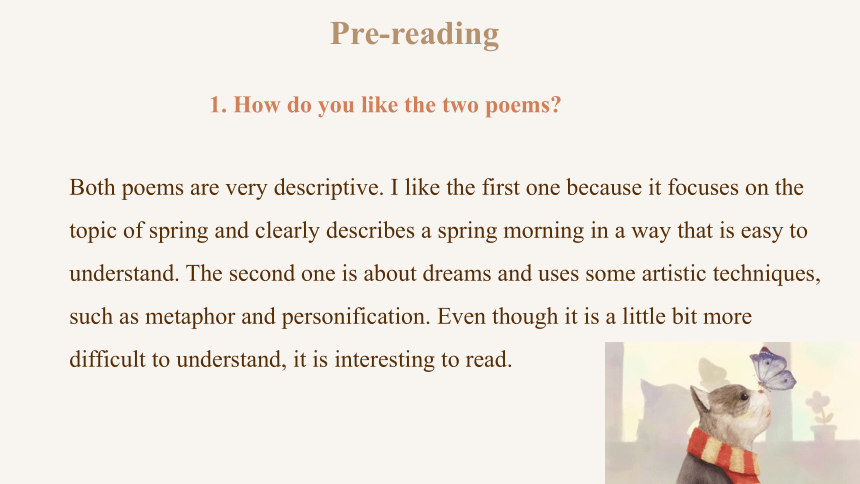
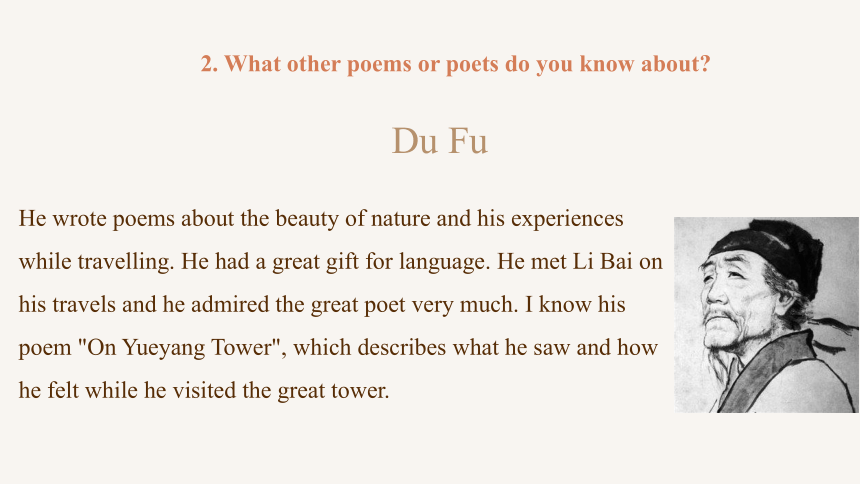
文档简介
(共35张PPT)
Section A
Welcome to the unit & Reading
Vocabulary
1. grasp
beyond one's grasp 某人无法理解
have a good grasp of... (=have a good command of…) 很好地掌握……
grasp sb. by the hand/arm 抓住某人的手/手臂
grasp a chance/an opportunity 急忙抓住机会,毫不犹豫地抓住机会
练习:他们现在精通多门外语。
They ___________________ many foreign languages now.
have a good grasp of
2. contradictory
be contradictory to 与……相矛盾/对立
contradict vt.反驳,驳斥;相矛盾
contradict sth. 反驳……;与……相矛盾
contradict sb. 反驳某人
contradict each other 相互矛盾
contradict oneself 自相矛盾
contradiction n.不一致,矛盾,对立
in contradiction to 与……相对立(或截然不同)
练习:There is a _____________ (contradict) between the two sets of figures.
contradiction
3. patience
be/run out of patience with… 对……没有耐心
lose patience with… 对……失去耐心
with patience 耐心地
patient adj.有耐心的 n.病人 impatient adj.没有耐心的
be patient with sb. /sth. 对某人/某事有耐心
patiently adv.耐心地 impatiently adv.没耐心地
impatience n.不耐烦,无耐心
练习:The manager listened to the customers' complaints attentively with great _________, trying not to miss any points.
patience
4. reward
a reward for (doing) sth. 因(做)某事而获得的奖励
in reward (for…) 作为(对……的)回报/奖赏
give/offer a reward to sb. for sth. 为某事而给某人奖励/报酬
reward sb. with sth. 用某物奖励某人
reward sb. for (doing) sth. 因(做)某事奖赏某人
练习:The students have been working hard on their lessons and their efforts ______________ (reward) with success in the end.
will be rewarded
5.reality
in reality 事实上,实际上
bring. . .back to reality 使……回到现实
turn. . .into reality 把……变为现实
real adj. 真正的,真实的 really adv. 事实上,真正地;确实
realize v. 将……变为现实,实现;意识到
realize one's dream 实现某人的梦想
realistic adj. 现实的;实事求是的
练习:To __________ (real) his dream as a pianist, he threw himself into practicing playing the piano when he was free.
realize
Leading in
1. What is poetry What is the biggest difference between poetry and other genres of literature
Poetry is a literary work in which a poet expresses beautiful and elegant quality, and his or her feelings through a distinctive style. Poetry differs from other genres of literature in that it highlights the aesthetic and rhythmic qualities of language, such as the sound symbolism represented by rhythms and rhymes, which are the actual sound effects created by the lines of poetry.
2. What is your understanding of the quotation on page 43
Poetry is an expression of what one feels or thinks in his/her heart or mind. When it is kept to oneself inside, it is called "one's will", but when it is expressed in words and shared with others, it is called poetry.
Pre-reading
1. How do you like the two poems
Both poems are very descriptive. I like the first one because it focuses on the topic of spring and clearly describes a spring morning in a way that is easy to understand. The second one is about dreams and uses some artistic techniques, such as metaphor and personification. Even though it is a little bit more difficult to understand, it is interesting to read.
2. What other poems or poets do you know about
He wrote poems about the beauty of nature and his experiences while travelling. He had a great gift for language. He met Li Bai on his travels and he admired the great poet very much. I know his poem "On Yueyang Tower", which describes what he saw and how he felt while he visited the great tower.
Du Fu
A poet from the Tang Dynasty, he started writing poetry from a very young age and most of his poems were accessible and appealing to the masses. His poem "The Old Charcoal Seller" tells of the people's tough life and the government's corruption during those times.
Bai Juyi
He is an English poet. I enjoy reading his poem "Good-Night". He uses language in a fun and creative way to show the different meanings of the words "good night".
Percy Bysshe Shelley
A famous American poet, she wrote poems that are creative and encourage careful thought. I like her poem "Hope Is the Thing with Feathers", which compares the feeling of hopefulness and expectation to a bird.
Emily Dickinson
Reading
1. Why do people read poems
Poems create vivid pictures and tell stories by using language creatively. Readers enjoy the challenge of trying to understand the poet's intention in writing a poem. A poem is a window into the poet's ideas and feelings about issues happening during the time when it was written. Readers can look at the poem's form and literary devices to see what the poet saw. By reading it aloud, they can feel the rhythms and rhymes of the poem as well as the poet's emotions.
2. What aspects of a poem do you pay attention to when you read it
I pay attention to a poem's form, its rhythm and rhyme, as well as the words used by the poet. The purpose of the poem is often shown by its form. For example, poets use extremely long forms for narrating stories. A poem's rhythm and rhyme help me understand the poet's feelings through sound. Word choice and literary devices enable me to understand the meaning of the poem better.
Skimming
Sound
Sense
How does it sound
an explorer in an unfamiliar landscape
patient
fully understand a poem to appreciate it
Scanning
1. How is poetry different from other types of literature
More than other types of literature, it usually implies a deeper meaning beyond the words on the page.
2. What aspects should you pay special attention to when you read a poem aloud
The aspects of rhythm, repeated words, rhymes and other special effects.
3. What are the basic questions you should ask to understand a poem
Who is talking Who is being talked to What is being described Is there a sense of place Are there other people or objects there
4. What does the lecturer think of poems that are easy to understand
They are often less interesting than those that constantly reveal deeper and previously unrecognized meanings.
Discussion
1. Focus on Paragraph 2, read aloud the stanza from Sweet and Low. How does it sound
Firstly, the words "Wind of the western sea" are repeated.
Secondly, there are several rhyming words: "low" rhyming with "blow" and "go", "sea" rhyming with "me".
2. Focus on Paragraph 3, read aloud the stanza from Caged Bird.
(1) What is being described
The poet is talking about a singing bird which is kept in a cage.
(2) What images come into your mind when reading it
When we read it, we see in our mind the images of a bird in a cage and a distant hill.
3. Read paragraphs 4 and 5 and answer the following questions.
(1) What should you do when you have difficulty in understanding a poem
When we have difficulty in understanding a poem, we should set it aside and come back to it later. With our insight into life becoming deeper, we may one day find it not so hard to understand at all.
(2) According to the lecturer, what is more important in appreciating a poem
Poetry reading can make us feel something or let us perceive another level of meaning, which is more important and worth our effort.
Choose one of the poems in the lecture transcript and think about the sound and sense of the poem. How does it make you feel
The poem by Maya Angelou describes the image of a caged bird wanting to be free. The lines are short and simple, which makes the message more direct and powerful. The short lines could also imply the sense of being in a small cage with very little space to fly around in. This does not stop the bird from singing though, and by repeating the sound of some words: “trill”, “still” and “hill” I can imagine the sound that the bird makes as it sings its lonely song. "Caged Bird" reminds me of the possibilities we have in life, and that we should look past our current limitations.
Thinking
1. What are the functions of the three poems quoted in this transcript
The first example (lines from "Sweet and Low" by Alfred Tennyson) sounds great with strong rhythm and it is written in rhyme. The lecturer uses it to support the tip of "follow your ears". The second example (lines from "Caged Bird" by Maya Angelou) includes several images. By using it, the lecturer suggests paying attention to images in poems when reading a poem. The third example (lines from "Stopping by Woods on a Snowy Evening" by Robert Frost) is not easy to understand, which is suitable as an example to support the tip of "be patient when having trouble in understanding a poem."
2. Why doesn't the lecturer quote a poem as an example to support the fourth tip
By giving the fourth tip, the lecturer emphasizes that the importance of reading poems lies in what the poem can make us feel or perceive. Unlike the previous three tips, this tip is not focusing on the ways to understand a poem, but on what attitude and expectations we should have when reading a poem. As a result, it is unnecessary to give an example of a poem to support this tip since it is not related to the understanding of the content or meaning of a poem.
Is the last paragraph a good ending Why or why not
The last paragraph is a good ending. At the beginning of the lecture, the speaker points out that poetry is a combination of "sound" and "sense". The last paragraph echoes the beginning by mentioning it again, which makes the lecture more coherent.
Group work
Apart from the four tips given by the lecturer, what other tips can you give on how to read a poem
From my point of view, to understand a poem better, we should also know more about the poet and the background in which the poem was created—the theme of a poem usually has a close relationship with the background in which the poet wrote it.
After-reading
Finish B1
set aside
remote
rewarding
contradictory
Complex
interpreting
constantly
dig up
Thinking
1. What does the author mean by "contradictory poems"
In some poems, the poet starts with one particular image, and then adds something that seems not to be in the correct place. These lines, which stick out, make the poems interesting.
2. Interpreting poetry can be difficult. Why does the author still enjoy it
Because it makes the author wonder-sometimes it is like a riddle to solve, or a question to answer.
The lecturer says that one does not need to fully understand a poem to appreciate it. Do you agree Support your opinion with your own experience of reading poetry.
Yes, I agree. There are other aspects of poetry that can be appreciated besides the poet's message. I recall reading "Sonnet 18" by William Shakespeare. The language was quite difficult to understand, but because of the sound aspects, I appreciated its easy flowing rhythm and rhymes. It was very pleasant to read-like a song. I hope to understand its full message one day.
Finish B2
noun + verb-ing painstaking, heartbreaking, time-consuming, eye-catching
noun + verb-ed snow-covered, handmade, tongue-tied, sun-dried
noun + adjective lifelong, world-famous, homesick, duty-free
adverb + verb-ing everlasting, fast-flowing, bestselling, far-reaching
Finish B3
When I see the beautiful flowers
I can look at them for hours
My heart feels glad
And I stop feeling bad
I love their smell
And all is well
Section A
Welcome to the unit & Reading
Vocabulary
1. grasp
beyond one's grasp 某人无法理解
have a good grasp of... (=have a good command of…) 很好地掌握……
grasp sb. by the hand/arm 抓住某人的手/手臂
grasp a chance/an opportunity 急忙抓住机会,毫不犹豫地抓住机会
练习:他们现在精通多门外语。
They ___________________ many foreign languages now.
have a good grasp of
2. contradictory
be contradictory to 与……相矛盾/对立
contradict vt.反驳,驳斥;相矛盾
contradict sth. 反驳……;与……相矛盾
contradict sb. 反驳某人
contradict each other 相互矛盾
contradict oneself 自相矛盾
contradiction n.不一致,矛盾,对立
in contradiction to 与……相对立(或截然不同)
练习:There is a _____________ (contradict) between the two sets of figures.
contradiction
3. patience
be/run out of patience with… 对……没有耐心
lose patience with… 对……失去耐心
with patience 耐心地
patient adj.有耐心的 n.病人 impatient adj.没有耐心的
be patient with sb. /sth. 对某人/某事有耐心
patiently adv.耐心地 impatiently adv.没耐心地
impatience n.不耐烦,无耐心
练习:The manager listened to the customers' complaints attentively with great _________, trying not to miss any points.
patience
4. reward
a reward for (doing) sth. 因(做)某事而获得的奖励
in reward (for…) 作为(对……的)回报/奖赏
give/offer a reward to sb. for sth. 为某事而给某人奖励/报酬
reward sb. with sth. 用某物奖励某人
reward sb. for (doing) sth. 因(做)某事奖赏某人
练习:The students have been working hard on their lessons and their efforts ______________ (reward) with success in the end.
will be rewarded
5.reality
in reality 事实上,实际上
bring. . .back to reality 使……回到现实
turn. . .into reality 把……变为现实
real adj. 真正的,真实的 really adv. 事实上,真正地;确实
realize v. 将……变为现实,实现;意识到
realize one's dream 实现某人的梦想
realistic adj. 现实的;实事求是的
练习:To __________ (real) his dream as a pianist, he threw himself into practicing playing the piano when he was free.
realize
Leading in
1. What is poetry What is the biggest difference between poetry and other genres of literature
Poetry is a literary work in which a poet expresses beautiful and elegant quality, and his or her feelings through a distinctive style. Poetry differs from other genres of literature in that it highlights the aesthetic and rhythmic qualities of language, such as the sound symbolism represented by rhythms and rhymes, which are the actual sound effects created by the lines of poetry.
2. What is your understanding of the quotation on page 43
Poetry is an expression of what one feels or thinks in his/her heart or mind. When it is kept to oneself inside, it is called "one's will", but when it is expressed in words and shared with others, it is called poetry.
Pre-reading
1. How do you like the two poems
Both poems are very descriptive. I like the first one because it focuses on the topic of spring and clearly describes a spring morning in a way that is easy to understand. The second one is about dreams and uses some artistic techniques, such as metaphor and personification. Even though it is a little bit more difficult to understand, it is interesting to read.
2. What other poems or poets do you know about
He wrote poems about the beauty of nature and his experiences while travelling. He had a great gift for language. He met Li Bai on his travels and he admired the great poet very much. I know his poem "On Yueyang Tower", which describes what he saw and how he felt while he visited the great tower.
Du Fu
A poet from the Tang Dynasty, he started writing poetry from a very young age and most of his poems were accessible and appealing to the masses. His poem "The Old Charcoal Seller" tells of the people's tough life and the government's corruption during those times.
Bai Juyi
He is an English poet. I enjoy reading his poem "Good-Night". He uses language in a fun and creative way to show the different meanings of the words "good night".
Percy Bysshe Shelley
A famous American poet, she wrote poems that are creative and encourage careful thought. I like her poem "Hope Is the Thing with Feathers", which compares the feeling of hopefulness and expectation to a bird.
Emily Dickinson
Reading
1. Why do people read poems
Poems create vivid pictures and tell stories by using language creatively. Readers enjoy the challenge of trying to understand the poet's intention in writing a poem. A poem is a window into the poet's ideas and feelings about issues happening during the time when it was written. Readers can look at the poem's form and literary devices to see what the poet saw. By reading it aloud, they can feel the rhythms and rhymes of the poem as well as the poet's emotions.
2. What aspects of a poem do you pay attention to when you read it
I pay attention to a poem's form, its rhythm and rhyme, as well as the words used by the poet. The purpose of the poem is often shown by its form. For example, poets use extremely long forms for narrating stories. A poem's rhythm and rhyme help me understand the poet's feelings through sound. Word choice and literary devices enable me to understand the meaning of the poem better.
Skimming
Sound
Sense
How does it sound
an explorer in an unfamiliar landscape
patient
fully understand a poem to appreciate it
Scanning
1. How is poetry different from other types of literature
More than other types of literature, it usually implies a deeper meaning beyond the words on the page.
2. What aspects should you pay special attention to when you read a poem aloud
The aspects of rhythm, repeated words, rhymes and other special effects.
3. What are the basic questions you should ask to understand a poem
Who is talking Who is being talked to What is being described Is there a sense of place Are there other people or objects there
4. What does the lecturer think of poems that are easy to understand
They are often less interesting than those that constantly reveal deeper and previously unrecognized meanings.
Discussion
1. Focus on Paragraph 2, read aloud the stanza from Sweet and Low. How does it sound
Firstly, the words "Wind of the western sea" are repeated.
Secondly, there are several rhyming words: "low" rhyming with "blow" and "go", "sea" rhyming with "me".
2. Focus on Paragraph 3, read aloud the stanza from Caged Bird.
(1) What is being described
The poet is talking about a singing bird which is kept in a cage.
(2) What images come into your mind when reading it
When we read it, we see in our mind the images of a bird in a cage and a distant hill.
3. Read paragraphs 4 and 5 and answer the following questions.
(1) What should you do when you have difficulty in understanding a poem
When we have difficulty in understanding a poem, we should set it aside and come back to it later. With our insight into life becoming deeper, we may one day find it not so hard to understand at all.
(2) According to the lecturer, what is more important in appreciating a poem
Poetry reading can make us feel something or let us perceive another level of meaning, which is more important and worth our effort.
Choose one of the poems in the lecture transcript and think about the sound and sense of the poem. How does it make you feel
The poem by Maya Angelou describes the image of a caged bird wanting to be free. The lines are short and simple, which makes the message more direct and powerful. The short lines could also imply the sense of being in a small cage with very little space to fly around in. This does not stop the bird from singing though, and by repeating the sound of some words: “trill”, “still” and “hill” I can imagine the sound that the bird makes as it sings its lonely song. "Caged Bird" reminds me of the possibilities we have in life, and that we should look past our current limitations.
Thinking
1. What are the functions of the three poems quoted in this transcript
The first example (lines from "Sweet and Low" by Alfred Tennyson) sounds great with strong rhythm and it is written in rhyme. The lecturer uses it to support the tip of "follow your ears". The second example (lines from "Caged Bird" by Maya Angelou) includes several images. By using it, the lecturer suggests paying attention to images in poems when reading a poem. The third example (lines from "Stopping by Woods on a Snowy Evening" by Robert Frost) is not easy to understand, which is suitable as an example to support the tip of "be patient when having trouble in understanding a poem."
2. Why doesn't the lecturer quote a poem as an example to support the fourth tip
By giving the fourth tip, the lecturer emphasizes that the importance of reading poems lies in what the poem can make us feel or perceive. Unlike the previous three tips, this tip is not focusing on the ways to understand a poem, but on what attitude and expectations we should have when reading a poem. As a result, it is unnecessary to give an example of a poem to support this tip since it is not related to the understanding of the content or meaning of a poem.
Is the last paragraph a good ending Why or why not
The last paragraph is a good ending. At the beginning of the lecture, the speaker points out that poetry is a combination of "sound" and "sense". The last paragraph echoes the beginning by mentioning it again, which makes the lecture more coherent.
Group work
Apart from the four tips given by the lecturer, what other tips can you give on how to read a poem
From my point of view, to understand a poem better, we should also know more about the poet and the background in which the poem was created—the theme of a poem usually has a close relationship with the background in which the poet wrote it.
After-reading
Finish B1
set aside
remote
rewarding
contradictory
Complex
interpreting
constantly
dig up
Thinking
1. What does the author mean by "contradictory poems"
In some poems, the poet starts with one particular image, and then adds something that seems not to be in the correct place. These lines, which stick out, make the poems interesting.
2. Interpreting poetry can be difficult. Why does the author still enjoy it
Because it makes the author wonder-sometimes it is like a riddle to solve, or a question to answer.
The lecturer says that one does not need to fully understand a poem to appreciate it. Do you agree Support your opinion with your own experience of reading poetry.
Yes, I agree. There are other aspects of poetry that can be appreciated besides the poet's message. I recall reading "Sonnet 18" by William Shakespeare. The language was quite difficult to understand, but because of the sound aspects, I appreciated its easy flowing rhythm and rhymes. It was very pleasant to read-like a song. I hope to understand its full message one day.
Finish B2
noun + verb-ing painstaking, heartbreaking, time-consuming, eye-catching
noun + verb-ed snow-covered, handmade, tongue-tied, sun-dried
noun + adjective lifelong, world-famous, homesick, duty-free
adverb + verb-ing everlasting, fast-flowing, bestselling, far-reaching
Finish B3
When I see the beautiful flowers
I can look at them for hours
My heart feels glad
And I stop feeling bad
I love their smell
And all is well
同课章节目录
- Unit 1 Food matters
- Welcome to the unit
- Reading
- Grammar and usage
- Integrated skills
- Extended reading
- Project
- Unit 2 The Universal Language
- Welcome to the unit
- Reading
- Grammar and usage
- Integrated skills
- Extended reading
- Project
- Unit 3 The art of painting
- Welcome to the unit
- Reading
- Grammar and usage
- Integrated skills
- Extended reading
- Project
- Unit 4 Exploring poetry
- Welcome to the unit
- Reading
- Grammar and usage
- Integrated skills
- Extended reading
- Project
